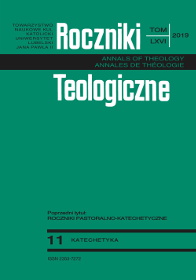Fenomen dzieciństwa w kontekście edukacyjnym. Myśląc z Walterem Kohanem
Abstrakt
Artykuł ma na celu ukazanie, w jaki sposób nasze rozumienie dzieciństwa, myślenia i czasu determinuje nasze wartości, rozumienie i praktyki edukacyjne. W zasadniczej strukturze obejmuje on pięć dobrze znanych terminów: dzieciństwo, edukacja, filozofia, czas, myślenie, które domagają się ponownego przemyślenia, zarówno indywidualnie, jak i w ich wzajemnych powiązaniach. Każdy z tych terminów zostaje rozwinięty w toku refleksji. Aby osiągnąć to zamierzenie artykuł koncentruje się na pracach Waltera Kohana, którego wkład we współczesną filozofię edukacji jest ważny i oryginalny. W kluczowych terminach w dziedzinie filozofii edukacji Kohan opisuje edukację jako dziecięcą (philosophy for children). Kohan rozwija swoje poglądy na temat edukacji w dialogu z wieloma filozofami i wychowawcami. Poprzez szereg pytań Kohan problematyzuje pedagogiczną, polityczną wartość umieszczania praktyki filozoficznej w dziedzinie edukacji obywatelskiej w kontekście dzieciństwa. W ten sposób tworzy on warunki dla edukacji odpowiedzialnej.
Bibliografia
Arendt H., Between Past and Future, New York 2006.
Arendt H., The Human Condition, Chicago 1958.
Blake W., The Marriage of Heaven and Hell, w: G. Keynes (red.), Blake: The Complete Writings, Oxford 1966.
Domingo Moratalla T., Application: Between Hermeneutics and Education. Paul Ricoeur's Perspective, „Studia Paedagogica Ignatiana” 18(2015), s. 97-114.
Gadamer H.G., Education is Self-Education, red. i tł. J. Cleary, P. Hogan, „Journal of Philosophy of Education” 35(2001), nr 4, s. 529-538.
Kennedy D., School and the Future of Schole: A Preliminary Dialogue with David Kennedy, w: Childhood, Education, and Philosophy: New Ideas for an Old Relationship, London−New York 2015, xxi-xxix.
Kohan W., Childhood, Education, and Philosophy: New Ideas for an Old Relationship, London−New York 2015.
Kohan W., Paulo Freire: Other Childhoods for Childchood, „Educação em Revista” (34)2018, s. 1-37.
Kohan W., School and the Future of schole: A Preliminary Dialogue with David Kennedy, w: Childhood, Education, and Philosophy: New Ideas for an Old Relationship, London−New York 2015, xxi-xxix.
Kohan W., Time, Thinking, and the Experience of Philosophy in School, red. N. Levinson, „Philosophy of Education” 2016, s. 429-436. [https://educationjournal.web.illinois.edu/archive/index.php/pes/article/view/5298.pdf].
On Childhood, Thinking and Time: Educating Responsibly, red. B. Weber, W. Kohan, [mps.]
Santos-Vieira M., Fusing the Horizons: Heidegger, Nietzsche and The Time of the Augenblick, „Studia Philosophiae Christianae” 49(2013), s. 137-154.
Weber B., Hans-Georg Gadamer and the Art of Understanding, w: B. Weber, E. Marsal, T. Dobashi (red.), Children Philosophize Worldwide: Theoretical and Practical Concepts, Frankfurt am Main 2009, s. 307-322.
Wierciński A., The Hermeneutics of Lived Time: Education as the Way of Being,w: P. Fairfield, S. Geniusas (red.), Relational Hermeneutics: Essays in Comparative Philosophy, London 2018, s. 52-62.
Copyright (c) 2019 Roczniki Teologiczne

Utwór dostępny jest na licencji Creative Commons Uznanie autorstwa – Użycie niekomercyjne – Bez utworów zależnych 4.0 Międzynarodowe.





